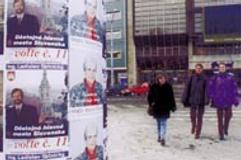Archive of articles - December 1998, page 3
If you desire to read an old article, use the search bar or select the publication date.
Import certificates and restrictions scare off investors
Foreign businessmen, diplomats and economists say that the certification process required to import goods into Slovakia is so complex and time-consuming that it is actually discouraging foreign companies from entering the Slovak market. What is more, they say that the certificates are only part of an overall anti-import policy that is sending the wrong signals abroad."These import restrictions are a form of economic nationalism and they are not productive," said Mark Bocchetti, the Economic Commercial Officer at the US embassy in Bratislava. "In a global economy, an anti-foreigner attitude is not a good attitude to have."Under current Slovak law, almost every import requires a certificate to be issued by a Slovak inspection office guaranteeing its safety and quality.
T-bill yields set mark for 3-month rates
The Slovak foreign exchange and money market is enjoying a period of extended calm aided by low interest of customers and market participants. The crown floated between minus 10.3 and 10.7%, but remained stable as the German mark/Slovak crown cross moved in the range of 21.540-680 within the covered period.The DEM/SKK exchange rate started to be more monitored as the index of the past basket, and the dollar/mark moves did not have impact on the mark/crown exchange rate. So the level of 21.400 can now be defined as the first support for the mark/crown exchange rate and the level of 21.650 as the first resist.The market saw central bank officials accepting "the current trend in the Slovak crown's exchange regime" and quoting as positive the fact that "there have been no extreme fluctuations since the abolition of the fluctuation range".
Community Grapevine
The Slovak Spectator wins Czech-Slovak Management CupUS Embassy announces Democracy Network GranteesSlovak wins European small business person of the yearCentre for European Politics holds discussion on culture
SDĽ jockeys for power with coalition partners
Slovakia's newly formed coalition government has been in power less than 50 days, but rifts within its ranks continue to open.During the second week of December, it was the turn of the reformed communist SDĽ party to rock the government boat. As the second strongest party in the four-member coalition, the SDĽ used tensions within the ruling SDK party to portray itself as an anchor of political stability.The SDK cast the first stone on November 23, when Justice Minister and SDK deputy Ján Čarnogurský voted against his own government's programme. The vote divided his party against itself and raised the possibility of a redistribution of coalition power in favour of the SDĽ.
Rendering unto Caesar more than his due
The details of the cabinet's new economic package will not be known until December 16, but one thing is already clear: The state will look after its pocketbook first, and only then consider the needs of the economy and of business. Working folk will have to wait a month of Sundays until someone inquires after their health.To recap, the main pillars of the package include price hikes for electricity, natural gas, transportation and groceries, tax increases and the re-introduction of an import duty. These measures are being driven by two imperatives - reducing the trade balance deficit and cutting the fiscal deficit of the state budget.
Equity market will bounce back in mid-January 1999
The beginning of December did not bring any significant changes on the equity market. The official SAX stock market index gained 4% during the last two weeks and closed at 85.20 on December 8. Trading remains very quiet and higher activity is not expected before the end of this year.According to Ľudovít Kaník, the new president of the national FNM privatisation agency, the FNM plans to swap corporate shares in its portfolio for privatization bonds (held by individuals) starting in mid-January 1999.The floating of shares in so-called strategic companies, such as power producer Slovenské Elektrárne, power distribution companies and savings bank Slovenská Sporiteľňa, would substantially invigorate the equity market.
Economic programme 'dangerous'
"It is the same, practically, as it was before under the previous government, which means they have not changed the system, only the faces."Peter Mihók, President of the Slovak Chamber of Commerce and IndustryPeter Mihók is the president of the Slovak Chamber of Commerce and Industry. Born in 1948, he has held advisory positions in state trade bodies for the better part of 20 years. The Slovak Spectator sat down on December 9 to talk with him about the new government's economic package and business philosophy.The Slovak Chamber of Commerce was established by an act of parliament in 1992, and represents Slovak companies and banks in their dealings with the state. In Mihók's words, the chamber is "the real voice of business in this country."
Transport fares to jump in 1999
Train and bus tickets will increase as much as 50% in the new year, but transport companies say the fare hikes will do little to mend their revenue shortfall."Even if prices were increased by 500%, we would still only break even - public transport would be neither profitable nor a loss-maker," said Miloš Čikovský, spokesman for the state-owned Slovak Railways (ŽSR).The transport hikes are part of an economic restriction package set to be approved by cabinet on December 16. Other austerity measures in the package include increases to energy, gas, fuel, tax and grocery rates.
Transpetrol shares back in state hands Minority shareholders demand $56 mil. compensation
Ignoring wails of displeasure from minority shareholders, the Finance Ministry on December 9 grabbed back a 34% stake in crude oil pipeline operator Transpetrol. The ministry had lost the shares in late October when they were seized by a regional court to settle a debt the state couldn't pay."The Finance Ministry simply corrected the decision of the Central Securities Register (SCP) and shifted the shares back," said Miloš Surovič, director of the capital market department at the Finance Ministry.But the unilateral move infuriated minority shareholders, each of whom had bought 5% chunks of the seized Transpetrol stake. Jaroslav Žák, president and general director of Bankers Trust ICC, represents the minority shareholders and says he is convinced the ministry's claw-back of the shares was illegal.
Christmas present ideas from The Slovak Spectator staff
Even in under-commercialised Slovakia, Christmas "shopping madness" is a fact of life in December. With only ten days to go before Christmas, most shops are open until the late evening hours. Some are even open on "zlatá nedeľa" ('golden Sunday'), December 19th, which means that everything you still want to buy will have been sold out an hour ago.To help protect readers from such disappointments, The Slovak Spectator has prepared a list of Christmas gift ideas and where to find them. Good luck!Jelka, art director, sour milk lover. "For my mother I will buy a nice silk scarf, hand made. I want it be very special."
Local politicians to slash state power Mayors in parliament promise local benefits from co-operation
Slovak citizens will return to the voting booth on December 18 and 19 - this time to elect municipal governments across the country. Candidates say that the elections, which are being contested by an unheard-of number of federal politicians, are expected to give fresh impetus to the decentralisation of state power."Citizens have the power to influence the direction of development in 2,867 towns and villages with their votes," said Michal Sýkora, chairman of the Association of Slovak Towns and Villages (ZMOS) in an interview for the daily Pravda.One of the biggest 'developments' that citizens can influence is that of decentralisation - relaxing the national government's grip on power and giving municipal governments the financial and legal tools to make important decisions for themselves.
- News digest: Finns air unseen video of Fico shooting, PM’s bloody jacket driven away by minister
- Weekend: What to make of Easter in Slovakia
- Hundreds of people ousted from Bratislava’s Volkswagen
- US giant pulls plug on Slovak factory, axing 137 jobs
- 3 free things to do in Bratislava in the next seven days
- When to shop over Easter: Opening hours for supermarkets in Slovakia
- “Return not,” the ocean cried. But I returned for her
- Cockroaches and crumbling toilets greet seven-year-old battling serious virus
- Hundreds of people ousted from Bratislava’s Volkswagen
- 3 free things to do in Bratislava in the next seven days
- Weekend: What to make of Easter in Slovakia
- News digest: Finns air unseen video of Fico shooting, PM’s bloody jacket driven away by minister
- US giant pulls plug on Slovak factory, axing 137 jobs
- When to shop over Easter: Opening hours for supermarkets in Slovakia
- Prices surge in Slovakia as inflation hits 15-month high
- Cockroaches and crumbling toilets greet seven-year-old battling serious virus
- “Return not,” the ocean cried. But I returned for her
- German shoemaker Lowa joins wave of factory closures in Slovakia
- Hundreds of people ousted from Bratislava’s Volkswagen
- Prices surge in Slovakia as inflation hits 15-month high
- US giant pulls plug on Slovak factory, axing 137 jobs
- When to shop over Easter: Opening hours for supermarkets in Slovakia
- Danish shoemaker to shut Slovak factory, axing 650 jobs in fresh blow to struggling region
- News digest: A parade too far? Fico heads to Moscow despite EU warnings Video
- A café in an ice cellar, sand dunes and a flower shop at the border
- “Return not,” the ocean cried. But I returned for her
- Hollywood turns Slovak highlands into high-speed playground Video
- German shoemaker Lowa joins wave of factory closures in Slovakia
- Chicken Jockey! Chicken Jockey! Chicken Jockey! Video
- Danish shoemaker to shut Slovak factory, axing 650 jobs in fresh blow to struggling region
- Prices surge in Slovakia as inflation hits 15-month high
- Hundreds of people ousted from Bratislava’s Volkswagen
- Slovakia's latest basketball star is destined for great things in the USA
- News digest: Finns air unseen video of Fico shooting, PM’s bloody jacket driven away by minister
- 3 free things to do in Bratislava in the next seven days
- He has been disciplined for delays. Now he will lead Slovakia’s top court
- Slovak startup Upfan declares war on fake tickets
- Smer MEP tells Slovaks to learn the EU’s rules – so they can break free from Brussels
- Too small to cope alone, Slovak villages are teaming up
- Top 10 events in Bratislava for foreigners More articles ›






